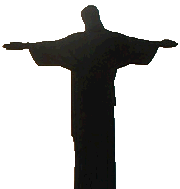08/06/2004: "Question of the Day: Why is Elijah who is with Moses during the Transfiguration?"
NOTE: If you'd like to submit a question, either post it as a comment in this entry or e-mail me at questions at thecrawfordfamily dot net.
Most people know who Moses is, but they don't know a whole lot about Elijah. As such they are confused as to why, of all the possible people from the history of the Jewish people it is him who is with Jesus and Moses at the tranfiguration. After all, he doesn't even get a book of the Old Testament named after him! ![]() All joking aside (which of course isn't very funny since neither does Moses get a book named after him, (although most of us can say what books of the Bible Moses is referenced in, but I doubt know what books of the Bible Elijah is referenced in) but I digress), Elijah doesn't figure in very prominently, in fact not at all, in any of the bible stories we grew up knowing.
All joking aside (which of course isn't very funny since neither does Moses get a book named after him, (although most of us can say what books of the Bible Moses is referenced in, but I doubt know what books of the Bible Elijah is referenced in) but I digress), Elijah doesn't figure in very prominently, in fact not at all, in any of the bible stories we grew up knowing.
The simple answer to the question is that Moses represents the Jewish Law and that Elijah represents the Prophets. By conversing with Christ in His transfigured state they are witnesses to the fact that Christ is the fulfillment of the law AND the prophets.
So, why is Elijah representative of the prophets? Well, first of all, he never "died". He was "translated" into the afterlife so that he would not have to taste death. As stated in the Second Book of Kings "a fiery chariot, and fiery horses parted them both asunder, and Elias went up by a whirlwind into heaven" (2:11). Also, unlike many prophets who weren't appreciated as prophets until after their lives, Elijah's prophecies immediately came true.
He came to announce to the Israelites that there would be a long drought because of the apostasy of Israel. For three years there was no rain or dew. During that time Elijah went to the desert to live off food that raven's brought him. He returned at the end of three years to have a "showdown" between his God and the pagan god of the fallen away Jews. Both he and the king set up altars and called to their gods. Nothing happened for the pagans but "the fire of the Lord" fell on Elijah's altar and the nation of Israel worshipped God. The drought ended that very evening.
Much else transpired but eventually by the guidance of the Lord, Elijah brought a new Jewish King to power in Israel un-seating the pagan king, setting Israel back on the path of righteousness.
Later in the Old Testament there are numerous references to Elijah, particularly strongly in Malachi but also in Sirach, Ezra, Judith, 1st Maccabees and 1st and 2nd Chronicles, that Elijah would be sent back to the people. (Malachi 3:23)
As you can see, Elijah had a very significant role in the history of Israel and in prophesy. It is therefore no surprise that Elijah shows up again with Christ at the Transfiguration.

